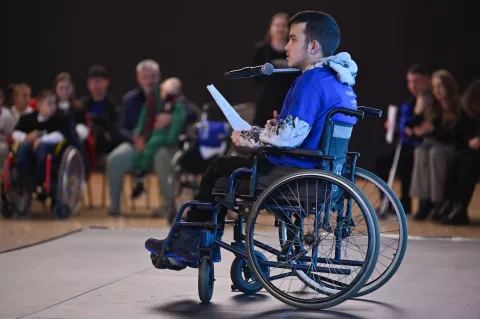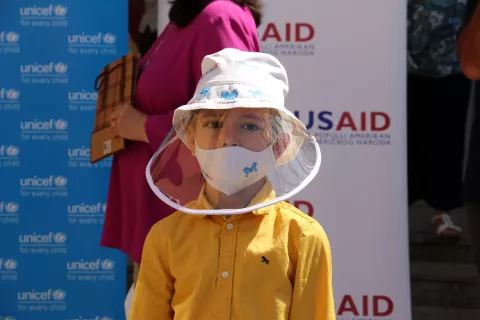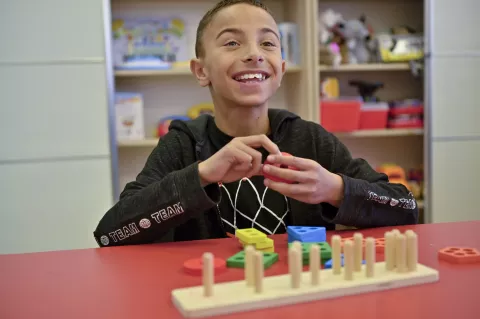Children with disabilities across Europe and Central Asia ‘face exclusion in many settings’, depriving them of basic services and care
New UNICEF report highlights inequities in care and access to essential services among children with disabilities

GENEVA, 1 December 2023 – Children with disabilities across Europe and Central Asia face discrimination in their homes, schools and communities, according to a new analysis of data from nine countries and territories across the region published today by UNICEF.
Children with Disabilities in Europe and Central Asia: A statistical overview of their well-being features data from Belarus, Georgia, Kosovo, Kyrgyzstan, Montenegro, North Macedonia, Serbia, Turkmenistan and Uzbekistan that highlight vast inequities in access to basic services and care experienced by children with disabilities.
“Children with disabilities still face exclusion in many settings: from limited support in schools, to not being read to or played with at home, to experiencing violent discipline,” said Regina De Dominicis, UNICEF Regional Director for Europe and Central Asia.
“While strong progress has been made, we need all services and environments to be adapted and made inclusive for children with disabilities. Central to this is breaking down stigma and discrimination in how children with disabilities are perceived and treated, while investing in capacities at every level.”
In most countries with available data, children with disabilities experience higher rates of psychological aggression and severe physical punishment from their caregivers compared to children without disabilities. More than 80 per cent of children in Kyrgyzstan and North Macedonia experience psychological aggression compared to 72 per cent and 69 per cent of children without disabilities.
Overall, children with disabilities are less likely to go to school than children without disabilities. In Turkmenistan and Serbia, children with disabilities are less likely to receive adequate early stimulation and responsive care than children without disabilities. In these countries, children with disabilities are also less likely to have two or more playthings. In Uzbekistan, a third of children with disabilities do not engage in play or activities with their parents or other adults at home.
Understanding these challenges, UNICEF works across the region to secure the best possible support for every child living with a disability, from early years to adolescence and as they prepare for quality independent life in their communities.
UNICEF prioritizes efforts to close residential institutions and create alternative family or community-based care for children with disabilities and boost investment in community services.
In many countries, home visiting programmes have been expanded to give families of children with disabilities adequate support and connect them to specialized services. This is critical for preventing family separation.
Across Europe and Central Asia, UNICEF works with governments to prioritize inclusive education by making mainstream schools and learning accessible, inclusive and safe from stigma, discrimination and violence.
The report provides a set of recommendations to countries to better support families and help ensure children with disabilities have equitable access to inclusive services. This includes:
- Making social services, education systems and environments inclusive and accessible to prevent family separation and ensure that all children benefit from community-based care and assistance, learning, information and play.
- Protecting children with disabilities from violence, abuse, neglect and exploitation and ensuring family support and access to child-friendly, disability-inclusive support and justice in cases of rights violations.
- Increasing access to mental health care and psychosocial support.
- Working to end stigma and discrimination against children with disabilities and ensuring that children with disabilities are empowered to inform and influence policy.
- Investing in social protection for children and their families that enables them to access critical services and alleviates poverty, deprivation and exclusion.
- Generating robust and inclusive data that go beyond prevalence and help understand outcomes for children with disabilities.
#####
Notes to editors
UNICEF acknowledges and commends the countries featured in this report for collecting disaggregated data on children with disabilities through Multiple Indicator Cluster Surveys.
Media contacts
About UNICEF
UNICEF promotes the rights and wellbeing of every child, in everything we do. Together with our partners, we work in 190 countries and territories to translate that commitment into practical action, focusing special effort on reaching the most vulnerable and excluded children, to the benefit of all children, everywhere.
For more information about UNICEF and its work for children, visit www.unicef.org.




